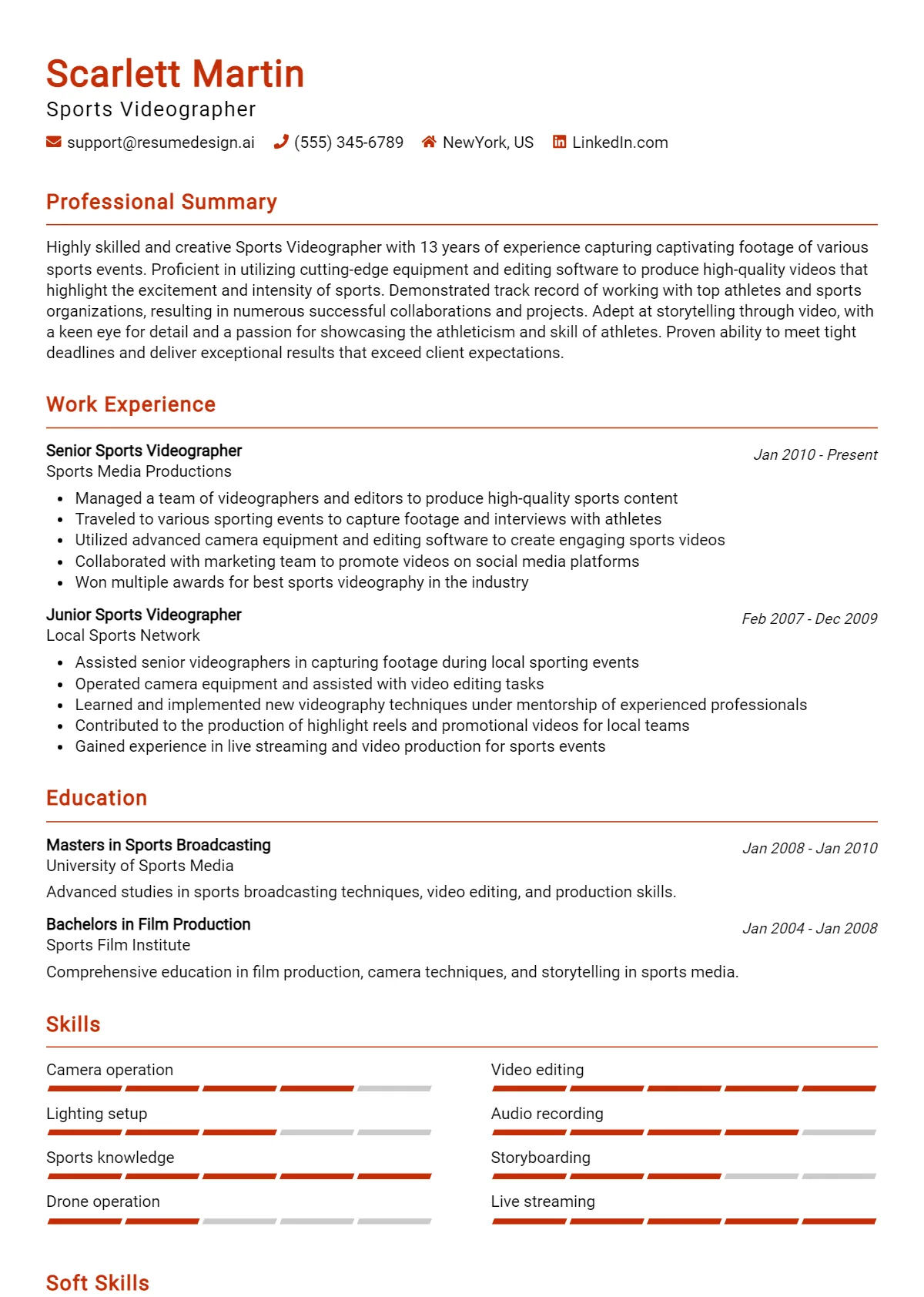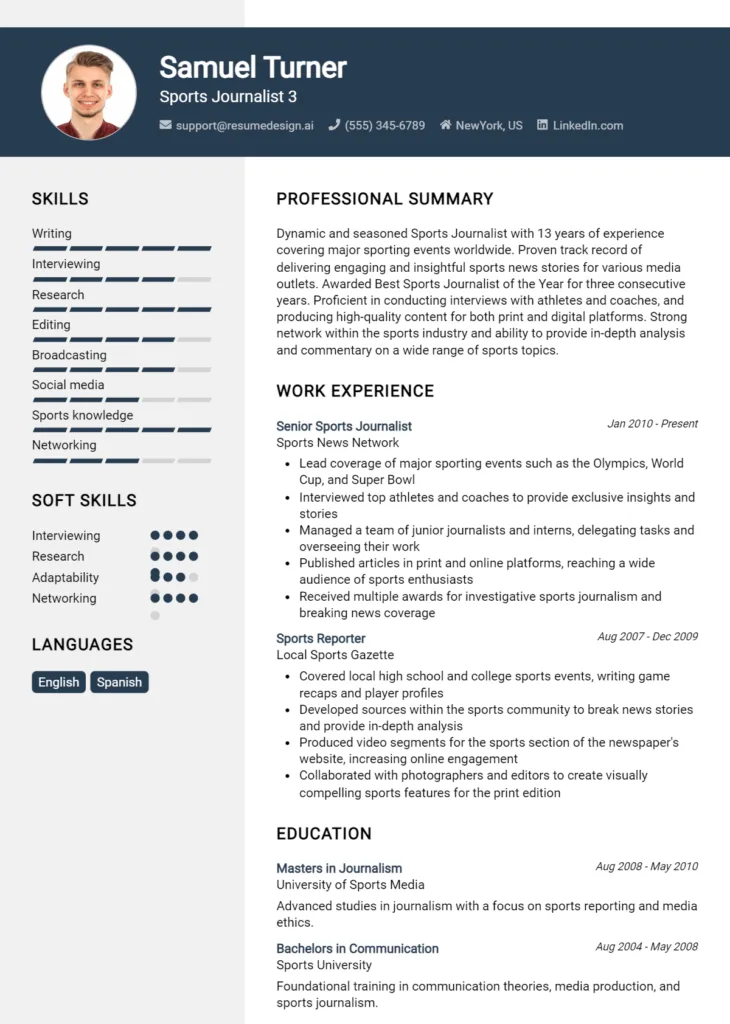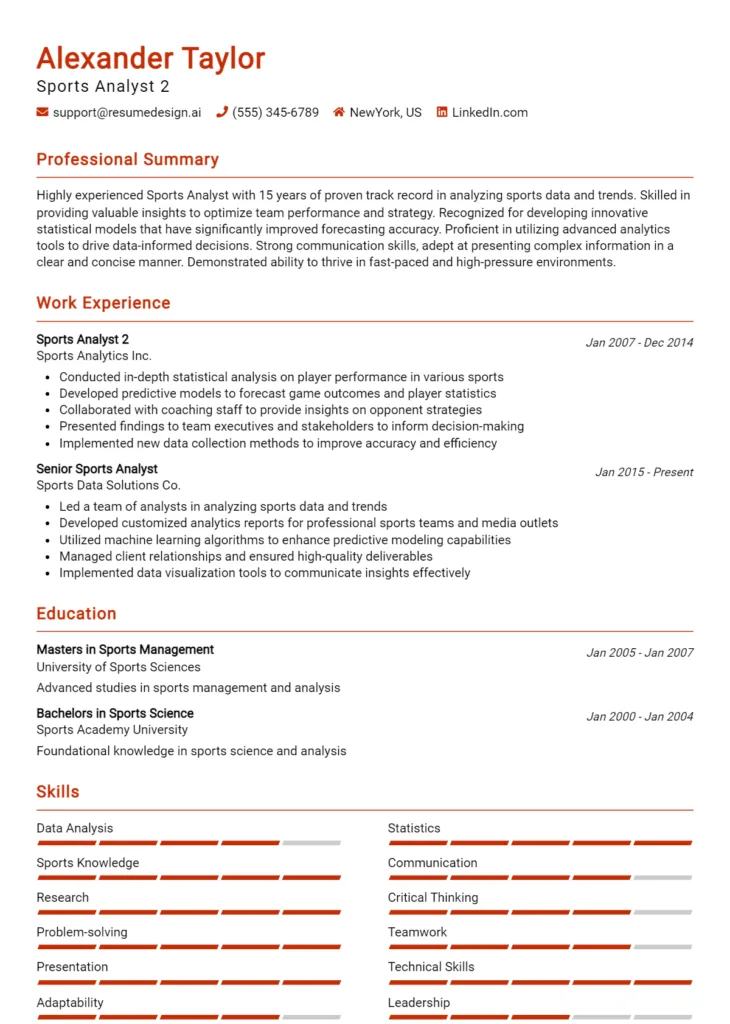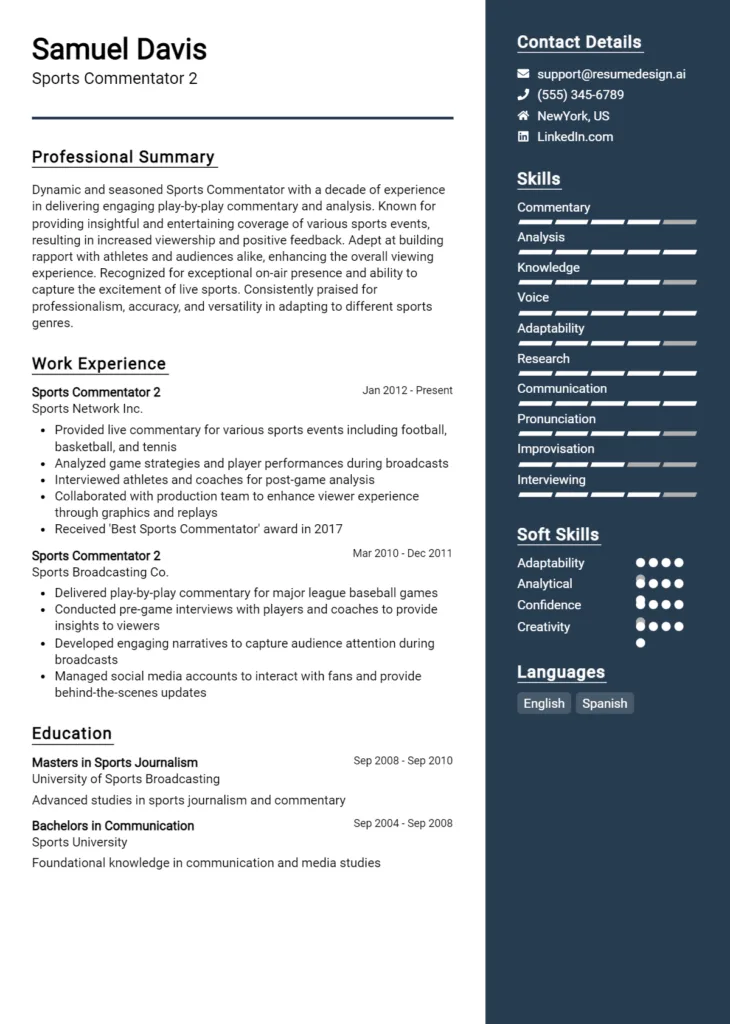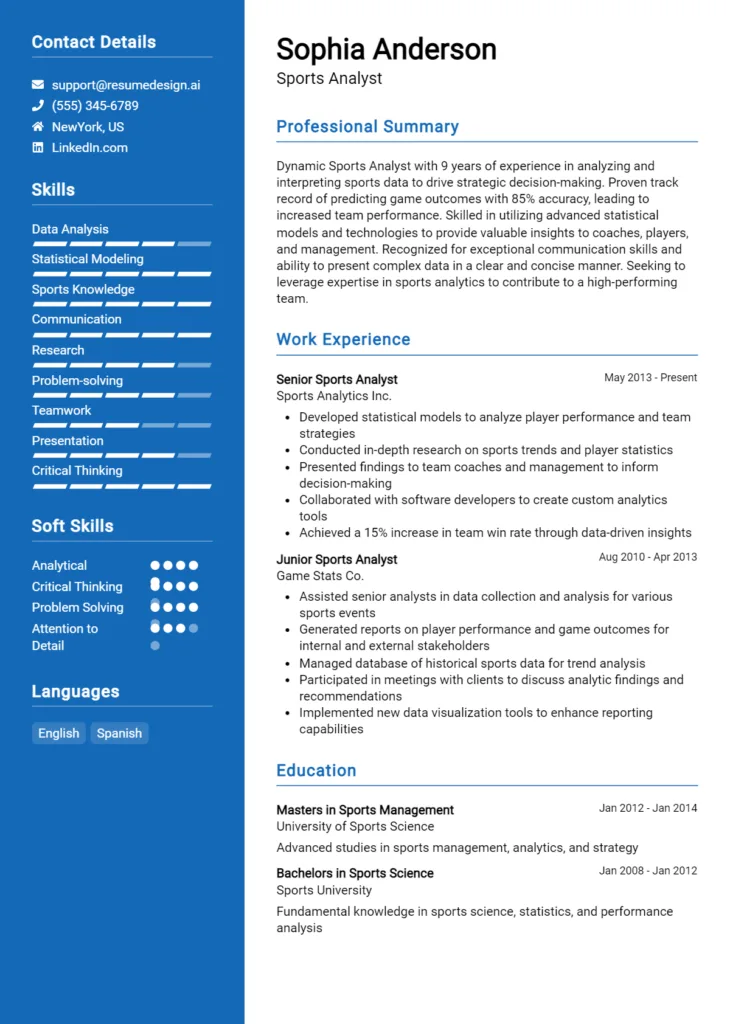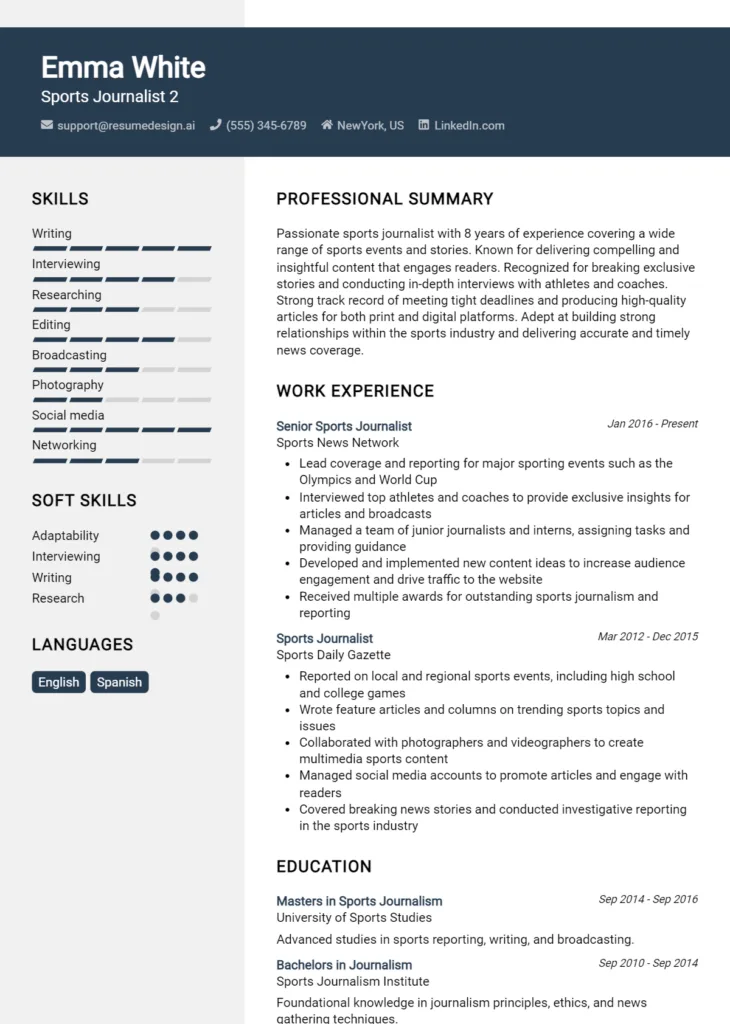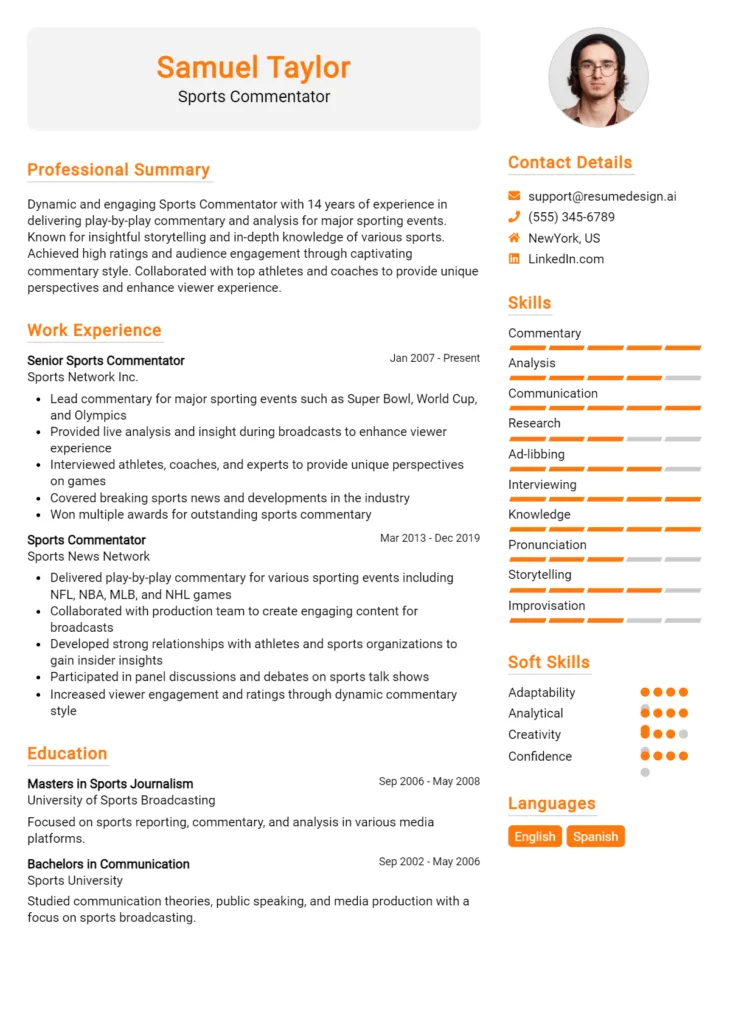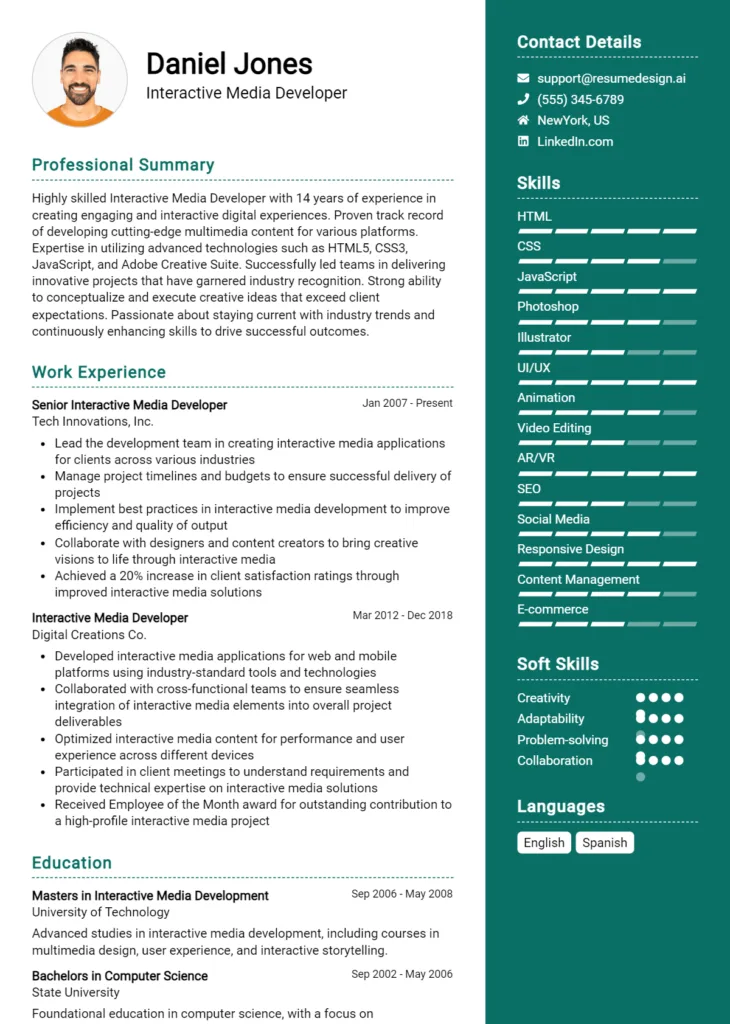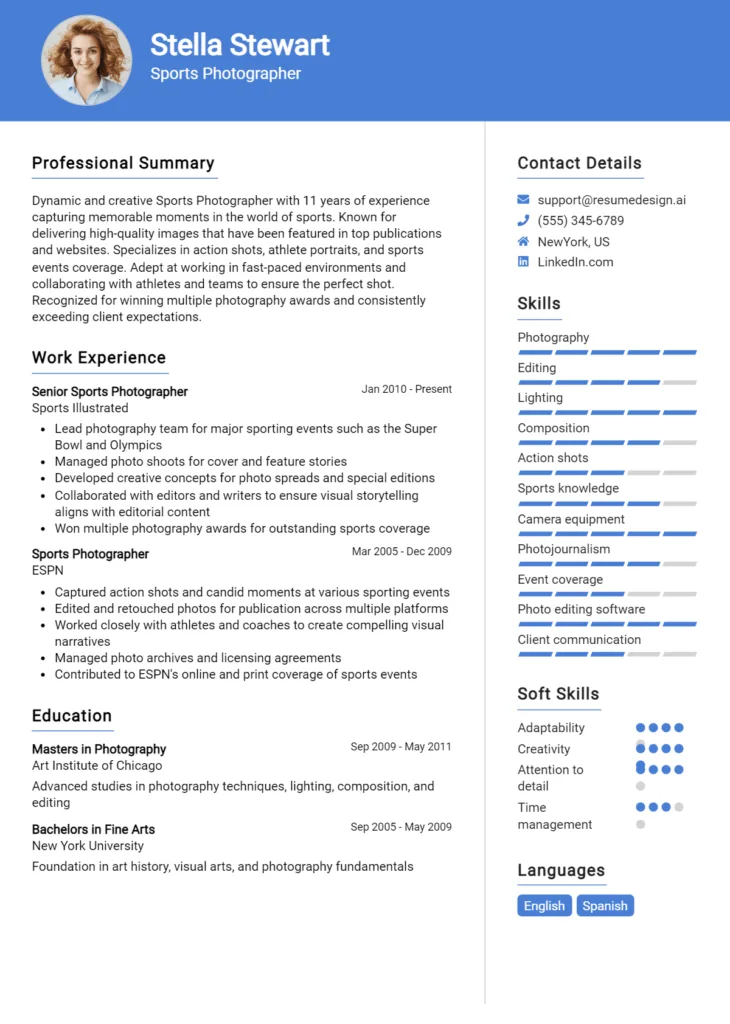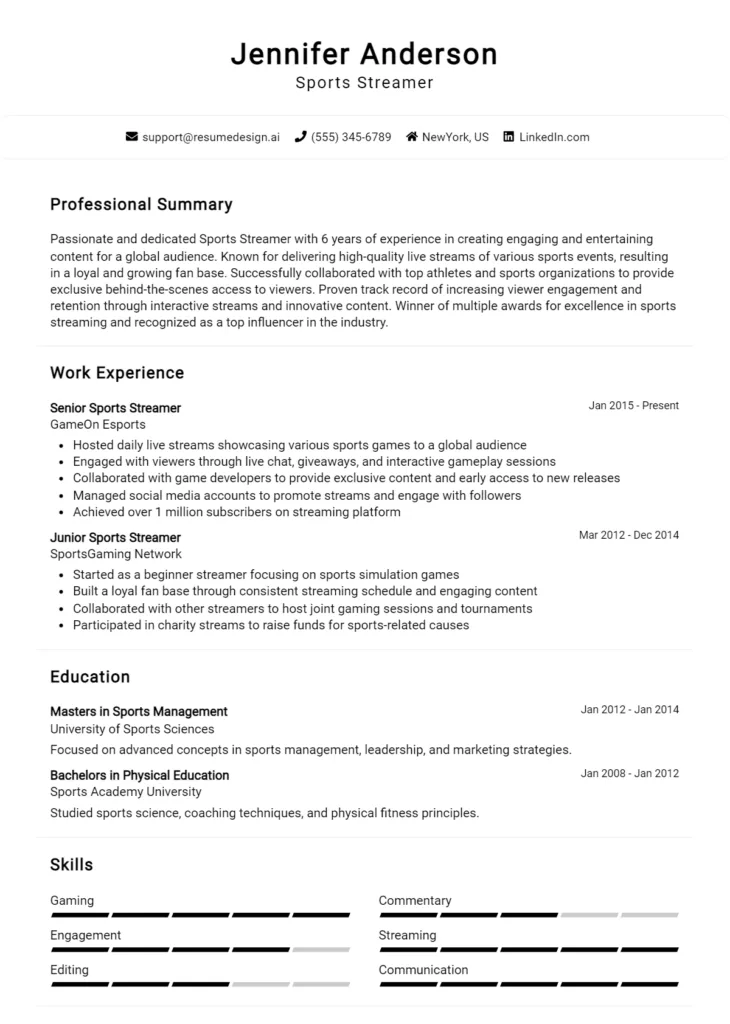Sports Videographer Core Responsibilities
A Sports Videographer plays a crucial role in capturing and producing high-quality video content for various sports events. This position requires technical expertise in videography, including camera operation and editing software proficiency, alongside strong operational skills for managing equipment and coordinating with teams. Problem-solving abilities are essential for overcoming challenges during live events. By effectively bridging departments such as marketing, coaching, and media, a Sports Videographer contributes significantly to the organization's goals. A well-structured resume can effectively highlight these technical and collaborative skills, showcasing an individual’s capacity to enhance the visual storytelling of the sports experience.
Common Responsibilities Listed on Sports Videographer Resume
- Capture live footage of sporting events using professional cameras.
- Edit and produce highlight reels and promotional videos.
- Coordinate with coaches and athletes to plan video shoots.
- Manage and maintain video equipment and software.
- Collaborate with marketing teams to create engaging content.
- Ensure compliance with copyright and licensing regulations.
- Utilize various filming techniques to enhance video quality.
- Record interviews and behind-the-scenes footage.
- Monitor and troubleshoot technical issues during events.
- Attend meetings to discuss video strategy and goals.
- Archive and organize video footage for future use.
- Stay updated with industry trends and technology advancements.
High-Level Resume Tips for Sports Videographer Professionals
In the competitive field of sports videography, a well-crafted resume is crucial for standing out among a sea of talented candidates. Your resume serves as the first impression you make on potential employers, and it is essential that it not only highlights your technical skills and creative vision but also reflects your unique achievements in the industry. A strong resume effectively communicates your ability to capture the dynamic essence of sports through video, making it a key tool in your job search. This guide will provide practical and actionable resume tips specifically tailored for Sports Videographer professionals, ensuring you showcase your best self to prospective employers.
Top Resume Tips for Sports Videographer Professionals
- Tailor your resume to match the specific job description, emphasizing relevant skills and experiences.
- Include a strong summary statement that encapsulates your unique strengths and passion for sports videography.
- Showcase your relevant experience by listing notable projects and clients, including the types of sports covered.
- Quantify your achievements with metrics such as viewer counts, social media shares, or awards received for your video work.
- Highlight industry-specific skills such as proficiency in editing software (e.g., Adobe Premiere, Final Cut Pro) and camera operation.
- Incorporate keywords from the job posting to ensure your resume passes through applicant tracking systems.
- Include a portfolio link to showcase your best work, demonstrating your videography style and expertise.
- List any certifications or training relevant to sports videography, such as courses in cinematography or sports production.
- Keep your resume concise and focused, ideally one page, to ensure that key information is easily accessible.
By implementing these tips, you can significantly enhance your resume's effectiveness and increase your chances of landing a job in the competitive field of sports videography. A polished resume that effectively showcases your skills and achievements will not only attract the attention of hiring managers but also set you on the path toward your dream career.
Why Resume Headlines & Titles are Important for Sports Videographer
In the competitive field of sports videography, a well-crafted resume headline or title serves as a critical first impression for hiring managers. It acts as a powerful summary that encapsulates the candidate's key qualifications and draws attention immediately. A strong headline can highlight relevant skills, experiences, or achievements in a concise manner, making it easier for recruiters to recognize the potential fit for their organization. By ensuring that the headline is directly related to the job being applied for, candidates can increase their chances of standing out in a crowded applicant pool.
Best Practices for Crafting Resume Headlines for Sports Videographer
- Keep it concise: Aim for a headline that is no longer than one or two lines.
- Be specific: Use terms that directly relate to the sports videography role to demonstrate expertise.
- Highlight key skills: Focus on your most relevant skills or experiences that make you a strong candidate.
- Use action words: Start with dynamic verbs that convey your capabilities and contributions.
- Incorporate metrics: If possible, include quantifiable achievements to showcase your impact.
- Tailor for each application: Customize your headline to align with the specific job description and requirements.
- Avoid jargon: Use clear and straightforward language to ensure understanding by all readers.
- Reflect your brand: Your headline should convey your unique style and professional identity as a videographer.
Example Resume Headlines for Sports Videographer
Strong Resume Headlines
Award-Winning Sports Videographer Specializing in Action Sports and Live Event Coverage
Creative Sports Videographer with 5+ Years of Experience in Producing Engaging Sports Content
Dynamic Sports Videographer Proficient in Multi-Camera Setup and Post-Production Editing
Weak Resume Headlines
Videographer Looking for Work
Experienced Professional in Media
The strong headlines are effective because they succinctly communicate the candidate's expertise, relevant experience, and unique skills that align with the role of a sports videographer. They are specific, engaging, and tailored to the job, which captures the attention of hiring managers. In contrast, the weak headlines fail to impress as they are vague and generic, lacking the necessary detail to convey the candidate’s qualifications or interest in the specific position. This lack of specificity can result in the candidate being overlooked in favor of more compelling applicants.
Writing an Exceptional Sports Videographer Resume Summary
A well-crafted resume summary is crucial for a Sports Videographer as it serves as a snapshot of the candidate's qualifications, immediately capturing the attention of hiring managers. This brief yet powerful introduction highlights key skills, relevant experiences, and notable accomplishments that align with the specific demands of the sports videography role. A strong summary should be concise and impactful, tailored to the job description, ensuring that it resonates with the employer's needs and sets the tone for the rest of the resume.
Best Practices for Writing a Sports Videographer Resume Summary
- Quantify Achievements: Use numbers to illustrate your impact, such as the number of events covered or views on published videos.
- Focus on Skills: Highlight key technical and creative skills relevant to sports videography, such as editing software proficiency or camera operation techniques.
- Tailor the Summary: Customize your summary for each job application, focusing on the specific requirements and values of the employer.
- Highlight Relevant Experience: Mention notable projects or roles that showcase your experience in sports videography.
- Use Action Verbs: Begin sentences with strong action verbs to convey your contributions effectively, such as "produced," "edited," or "directed."
- Keep it Concise: Aim for 2-4 sentences that succinctly summarize your qualifications without unnecessary fluff.
- Showcase Creativity: Include elements that reflect your creative approach to capturing compelling sports narratives.
- Include Professional Recognition: Mention any awards or recognitions received for your work in videography to enhance credibility.
Example Sports Videographer Resume Summaries
Strong Resume Summaries
Dynamic Sports Videographer with over 5 years of experience producing high-impact visual content for professional sports teams. Successfully increased social media engagement by 150% through innovative video storytelling techniques, delivering compelling highlight reels and behind-the-scenes coverage.
Creative Videographer specializing in sports, with a proven track record of capturing live events and editing captivating content. Achieved over 1 million views on YouTube for a series of game day highlights while collaborating closely with coaches and athletes to enhance storytelling.
Detail-oriented Sports Videographer with expertise in multi-camera setups and live streaming. Directed and produced over 100 sporting events, leading to a 30% increase in audience retention on digital platforms. Proficient in Adobe Premiere and Final Cut Pro.
Weak Resume Summaries
I am a videographer with experience in sports. I have made videos and worked with teams.
Enthusiastic about sports videography and looking for a position where I can use my skills in filming and editing.
The examples of strong resume summaries demonstrate specific accomplishments, quantifiable results, and relevant skills, making them impactful and tailored for the role. In contrast, the weak summaries lack detail and specificity, failing to convey any measurable achievements or unique qualifications, making them too generic to capture a hiring manager's attention effectively.
Work Experience Section for Sports Videographer Resume
The work experience section of a Sports Videographer resume is crucial as it serves as a testament to the candidate's technical skills, collaborative abilities, and capacity to deliver high-quality video products. This section not only highlights the candidate's hands-on experience in videography but also demonstrates their proficiency in managing teams and projects effectively. By quantifying achievements and aligning experiences with industry standards, candidates can present a compelling narrative that underscores their qualifications and readiness for the role, making it easier for potential employers to assess their fit for the job.
Best Practices for Sports Videographer Work Experience
- Highlight specific technical skills relevant to videography, such as camera operation, editing software proficiency, and lighting techniques.
- Quantify achievements with metrics, such as the number of projects completed, audience engagement levels, or improvements in production efficiency.
- Emphasize collaboration by detailing roles in team projects and contributions to successful outcomes.
- Use action verbs to convey a sense of initiative and impact in previous roles.
- Tailor experiences to align with industry standards and expectations, showcasing knowledge of current trends in sports videography.
- Include a variety of experiences, such as freelance work, internships, or volunteer opportunities, to illustrate versatility.
- Describe the context of work situations to provide clarity on the challenges faced and the solutions implemented.
- Keep descriptions concise and focused on relevant experiences that directly relate to the position applied for.
Example Work Experiences for Sports Videographer
Strong Experiences
- Led a team of 5 videographers in producing over 50 high-quality video highlights for a major sports league, resulting in a 30% increase in online viewership compared to the previous season.
- Implemented advanced editing techniques that reduced post-production time by 40%, allowing for quicker turnaround on project deliverables.
- Collaborated with coaching staff to create in-depth game analysis videos, enhancing player performance and contributing to a 20% improvement in win-loss ratio.
- Managed live-streaming events for local sports tournaments, achieving an average of 1,000 concurrent viewers, which doubled previous event viewership records.
Weak Experiences
- Filmed various sports events.
- Worked on video editing occasionally.
- Helped out with some team projects.
- Attended video production meetings.
The examples provided illustrate the distinction between strong and weak experiences in a Sports Videographer resume. Strong experiences are characterized by specific, quantifiable outcomes that demonstrate technical leadership and effective collaboration, making a clear impact on projects and teams. In contrast, weak experiences lack detail, specificity, and measurable results, which fail to convey the candidate's true capabilities and contributions to potential employers.
Education and Certifications Section for Sports Videographer Resume
The education and certifications section of a Sports Videographer resume is crucial, as it showcases the candidate's academic background and relevant qualifications that align with the demands of the role. This section not only emphasizes formal education but also highlights industry-relevant certifications and specialized training that demonstrate the candidate's commitment to continuous learning and professional development. By providing relevant coursework, certifications, and any specialized training, candidates can significantly enhance their credibility and show prospective employers that they possess the necessary skills and knowledge applicable to sports videography.
Best Practices for Sports Videographer Education and Certifications
- Include only relevant degrees and certifications that pertain to videography, film production, or sports broadcasting.
- List your educational qualifications in reverse chronological order, starting with the most recent.
- Highlight specific coursework that directly relates to sports videography, such as video editing, cinematography, or sports media production.
- Include industry-recognized certifications such as Adobe Certified Expert (ACE) for video editing software.
- Emphasize any specialized training or workshops attended that enhance your skills in sports videography.
- Clearly state the institution, degree, and date of completion for each educational entry.
- Use specific terminology related to the sports industry to illustrate your expertise and familiarity with the field.
- Provide a brief description of any relevant projects or practical experiences undertaken during your education.
Example Education and Certifications for Sports Videographer
Strong Examples
- Bachelor of Arts in Film and Media Studies, University of Southern California, 2022
- Adobe Certified Expert (ACE) in Premiere Pro, 2023
- Certificate in Sports Media Production, New York Film Academy, 2021
- Coursework in Cinematography and Sports Journalism, University of Southern California
Weak Examples
- Associate Degree in General Studies, Community College, 2015
- Certification in Microsoft Office Suite, 2019
- High School Diploma, 2012
- Outdated Certification in Basic Photography, 2010
The strong examples are considered relevant and beneficial for a Sports Videographer resume because they showcase direct connections to the field, including specific degrees and certifications that enhance the candidate's qualifications for the role. In contrast, the weak examples lack relevance to sports videography, consisting of general or outdated qualifications that do not align with current industry standards or demands. This distinction helps potential employers assess a candidate's readiness and expertise in the specific area of sports videography.
Top Skills & Keywords for Sports Videographer Resume
As a Sports Videographer, your resume should not only showcase your creativity and technical prowess but also highlight your essential skills that make you stand out in a competitive field. Skills play a crucial role in demonstrating your ability to capture the essence of athletic performance and convey it through visual storytelling. A well-rounded skill set can enhance your employability and show potential employers that you have the necessary capabilities to succeed in dynamic environments. By emphasizing both hard and soft skills, you can create a compelling resume that reflects your unique qualifications and experiences in sports videography.
Top Hard & Soft Skills for Sports Videographer
Hard Skills
- Proficient in video editing software (e.g., Adobe Premiere Pro, Final Cut Pro)
- Knowledge of camera operation and settings (DSLR, mirrorless, camcorders)
- Experience with motion graphics and animation
- Understanding of lighting techniques and equipment
- Familiarity with audio recording and mixing
- Skills in color correction and grading
- Capability in creating highlight reels and promotional videos
- Proficient in live streaming technologies and platforms
- Knowledge of sports regulations and filming protocols
- Experience with drone videography
Soft Skills
- Strong communication and interpersonal skills
- Ability to work under pressure and meet tight deadlines
- Excellent attention to detail and organizational skills
- Creative thinking and problem-solving abilities
- Adaptability to various filming environments and conditions
- Team collaboration and leadership experience
- Time management and prioritization skills
- Passion for sports and storytelling
- Ability to take constructive criticism and improve work
- Strong work ethic and professionalism
For more insights on essential skills and how to present your work experience effectively, consider exploring additional resources to enhance your resume.
Stand Out with a Winning Sports Videographer Cover Letter
Dear [Hiring Manager's Name],
I am writing to express my enthusiasm for the Sports Videographer position at [Company Name] as advertised on [where you found the job listing]. With a background in sports videography and a genuine passion for capturing the thrill of athletic competition, I am excited about the opportunity to contribute to your team. My experience working with various sports organizations has equipped me with the technical skills and creative vision necessary to produce high-quality video content that engages audiences and highlights the excitement of the game.
In my previous role with [Previous Company Name], I had the privilege of covering a range of sporting events, from local high school games to professional tournaments. I utilized industry-standard equipment and editing software to create dynamic highlight reels and promotional videos that showcased athletes' performances and the spirit of the events. My commitment to storytelling through video is evident in my ability to capture pivotal moments, such as game-winning plays and athlete interviews, which resonate with fans and enhance their connection to the sport.
I am particularly drawn to [Company Name] because of its reputation for innovative sports coverage and dedication to showcasing athletic talent. I am eager to bring my skills in video production, editing, and post-production to your team. My ability to work collaboratively with coaches, athletes, and fellow videographers has always resulted in a cohesive and engaging final product. I am confident that my strong work ethic and passion for sports will make a positive impact at [Company Name].
Thank you for considering my application. I look forward to the opportunity to discuss how my experience and vision align with the goals of your organization. I am excited about the possibility of contributing to [Company Name] and helping to elevate sports storytelling through my videography skills.
Sincerely,
[Your Name]
[Your Phone Number]
[Your Email Address]
Common Mistakes to Avoid in a Sports Videographer Resume
Crafting a compelling resume as a sports videographer is vital to standing out in a competitive field. However, many candidates make common mistakes that can hinder their chances of landing an interview. Understanding these pitfalls can help you create a more effective resume that showcases your skills, experience, and passion for sports videography. Here are some common mistakes to avoid:
Lack of Tailoring: Failing to customize your resume for each job application can make it seem generic. Always align your experience and skills with the specific requirements of the role.
Overloading with Technical Jargon: While industry-specific terms are important, excessive jargon can confuse hiring managers who may not be familiar with all technical details. Aim for clarity and ensure your resume is accessible.
Ignoring Soft Skills: Focusing solely on technical skills can overlook the importance of soft skills like teamwork, communication, and time management, which are crucial in sports videography.
Neglecting Visual Presentation: As a visual storyteller, your resume should reflect your aesthetic sensibility. Poor formatting or a cluttered layout can detract from your overall message.
Omitting Relevant Experience: It’s essential to include not only formal job experience but also internships, freelance work, and personal projects that showcase your videography skills.
Not Highlighting Achievements: Simply listing responsibilities without emphasizing accomplishments fails to demonstrate your impact. Use metrics or specific examples to highlight your contributions.
Using a One-Size-Fits-All Approach: A resume that lacks a clear focus on your unique strengths and experiences may not resonate with hiring managers. Ensure your personal brand comes through.
Forgetting to Include a Portfolio: As a videographer, your work speaks louder than words. Failing to provide a link to your portfolio or demo reel can be a missed opportunity to showcase your talent.
By avoiding these common mistakes, you can create a strong resume that effectively communicates your qualifications and passion for sports videography.
Conclusion
As a Sports Videographer, you play a crucial role in capturing the essence of athletic performances and delivering compelling visual stories that resonate with fans and teams alike. Throughout this article, we've discussed the essential skills and qualifications for succeeding in this dynamic field, including technical expertise in video equipment, a keen eye for detail, and a strong understanding of various sports. Additionally, we highlighted the importance of storytelling and creativity in producing engaging content that truly reflects the intensity and passion of sports.
Given the competitive nature of the industry, it's vital to present a polished and professional resume that showcases your unique skill set and experience. Take a moment to reflect on your current resume—does it effectively communicate your strengths as a Sports Videographer? Are you highlighting your technical skills, creative contributions, and any notable projects you’ve worked on?
We encourage you to utilize available resources to enhance your resume. Check out resume templates that can help you format your information effectively. You might also consider using a resume builder to streamline the process and ensure a professional appearance. For inspiration, browse through resume examples that can give you ideas on how to present your qualifications. Lastly, don’t forget about the importance of a strong introduction—explore our cover letter templates to make a great first impression.
Take action today to refine your Sports Videographer resume and stand out in this exciting field!

